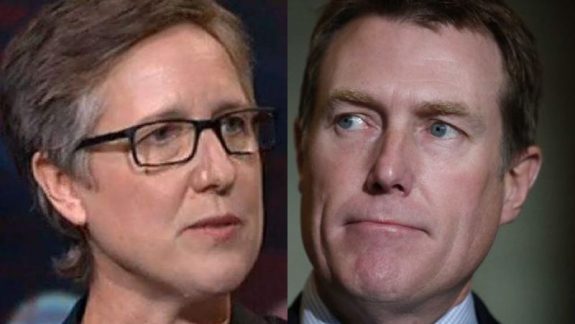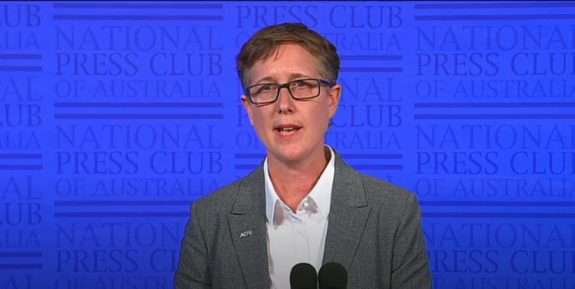Unflappable unions remain focused versus IR reform bills

In the federal Parliament’s final sitting week of 2020, Attorney-General Christian Porter has been unveiling the industrial relations reform “Omnibus Bill” via a piece-by-piece treatment – and Australia’s union movement has remained step-by-step in pace with a battle over the proposed legislative-based reforms.
In fact, Sally McManus, the national secretary of the Australian Council of Trade Unions (ACTU), has applied the blowtorch to the government – in the hottest of acetylene fashions, yet in her characteristic calm, measured delivery – in claiming that all of the hard work of the previous five months of industrial relations reform negotiations has been undone.
“These proposals were never raised during months of discussions with employers and the government,” McManus said on Tuesday, one day before Porter read two bills which would comprise the Morrison government’s measures of reform.
“The union movement will fight these proposals which will leave working people worse off.
“This was not the spirit of the talks with employers and the government, this is not about us all being in this together,” added McManus.
When the nation’s union and business leaders convened in June in Sydney and Canberra to commence bilateral negotiations on industrial relations reforms, both McManus and Porter – as well as many of the assembled representatives from both factions – agreed that if no accords were met, then the government would be drafting and introducing their own versions of reform measures.
That agreement had implied that the government’s measures would be geared in the form of a compromise between the interests among the two sides.
Instead, based on the early leaks over last weekend of the bills’ elements and highlights, they would be heavily favouring the business and employer groups’ lobbying efforts.
The two bills – the Fair Work (Registered Organisations) Amendment (Withdrawal from Amalgamations) Bill 2020 and the Fair Work Amendment (Supporting Australia’s Jobs and Economic Recovery) Bill 2020 – introduced by Porter in Parliamentary business in the upper house were finally released on Wednesday morning, and according to the ACTU, the government’s version of reforms under Morrison and Porter in these pieces of proposed legislation would:
- Break up merged unions within the currently-legislated five-year interval in which mergers must remain intact;
- Allow employers to cut wages and conditions to their workers, even to the point of allowing awards to dip below the safety net of minimum awards;
- Reduce rights of casual workers, and can even demote part- and full-time workers to a status of casuals, in order to revoke leave entitlements;
- Enable casual workers to become permanent part- or full-time employees tied to a single employer – however, if that option is not offered, workers have no recourse to challenge or enforce it;
- Place the “better off overall test” on the back burner for workers for an interval up to two years, despite what Porter claims to be a boost to the process of enterprise bargaining;
- Remove the Fair Work Commission’s (FWC) requirement that workers currently possess a right upon starting a job that their agreements must be explained to them within a seven-day interval;
- Enact anti-wage theft legislation, but with penalties which the ACTU sees as weaker than that in some states, such as in Victoria;
- And avoid assessments of penalties to employers for reducing or restricting rights to casual workers, while those workers would lose the right to due process to appeals
As a result, McManus can only feel a sense of empathy for the nation’s workforce, casuals and otherwise, especially happening a little over a fortnight before Christmas, at the end of what has been a challenging year for everyone.
“Working people, essential workers, have already sacrificed so much during this pandemic, these proposed laws will punish them,” said McManus.
ACTU secretary Sally McManus says the government’s industrial relations changes – finally released after being drip-fed all week – are the worst since Work Choices pic.twitter.com/aYBLVnxuw4
— Josh Butler (@JoshButler) December 9, 2020
The details of the bills come on the heels of a report released by Griffith University, where industrial relations research professor David Peetz wrote one conclusion that a majority of leave-deprived casuals also are not likely to receive casual loadings and other entitlements.
In citing this report, the ACTU puts it in the perspective not merely in regard to the industrial relations reform bills which were pending at the time, but to the lack of rights and entitlements which casual workers possess – rights and entitlements which are now hanging in the balance.
“The majority of casual workers are working the same hours every week, but with none of the entitlements that permanent workers can rely upon. They are being ripped off. The proposal from the Morrison government will not only entrench this, it will take rights off casual workers,” said McManus.
“On top of the lower pay and reduced rights, casuals also contend with the constant stress of having no job security,” added McManus.
Meanwhile, Porter – who also doubles in the Morrison government as its minister for industrial relations – refuted the ACTU’s claim that one in four workers will be worse off for wages under these bills.
“It is quite absurd,” Porter told Sky News on Wednesday morning.
“This isn’t about pay cuts for people, this is about more jobs, more hours, more ability to move from casual to permanent employment,” he added.
Porter also said that as daunting as the proposals in the bills are, no verdicts were expected this week.
In fact, debates marked with as much passion as facts and the ideologies of modern politics may cause the fates of these bills to last well into 2021, a reality which is not lost on Porter.
“It should also be said that the introduction of the [bills] today is by no means the end of the consultation process, with a Senate committee likely to examine the legislation in detail over the coming months,” Porter said on Wednesday.
“This is an opportunity for further submissions to be made by all sides of the debate and the government will be willing to consider any sensible amendments that pass the simple test of being good for job growth.
“The danger is that if those inside and outside the Parliament revert to their traditional ideological corners, these critical reforms could be delayed or even blocked, leaving business without crucial supports and workers without an opportunity to get back into jobs,” added Porter.
Also by William Olson:
ACTU advocating justice calls for on-the-job deaths
Overcome threats, halve insecure work numbers: McManus
Like what we do at The AIMN?
You’ll like it even more knowing that your donation will help us to keep up the good fight.
Chuck in a few bucks and see just how far it goes!










